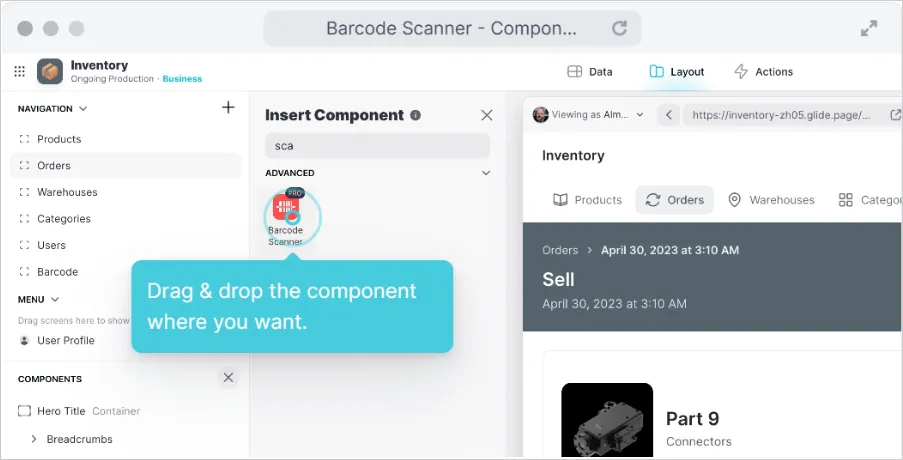Customer Stories
Empowering Glide Customers with Fast, Accurate Barcode Reading
Snapshot
Glide, a leading no-code software development platform, needed a robust, scalable barcode scanning component to meet customer demands. It needed to be bulletproof in challenging conditions, like those with low light levels, and easy to add to their apps. Within just 2 months, Glide was able to provide customers with ‘click to add’ barcode scanning within the Glide dashboard.
Intro
Glide’s mission is to put the power, beauty and magic of software development into the hands of new creators. They believe you shouldn’t have to be a developer to create custom software. Instead, anyone with a business problem to solve should be able to create custom business software that is powered by their data and fits the needs of their workflows.
Glide is no code software development platform that helps teams build the internal tools they need without relying on developers or designers. With Glide, companies can create custom tools that manage inventory, assets, work orders, and more without writing a single line of code. For many of Glide's customers, scanning barcodes was vitally important to build apps for inventory management, field repairs, or inspections.

The Challenge Faced
Glide had created an in-house barcode reader in response to customer demand. It met a short-term need but was not a good long-term solution. Glide needed a barcode reader that would be fast, accurate, and scalable to meet the needs of its larger customers. The barcode reader needed to perform in low-light conditions typical in many industrial environments.
Solution
True to its founding principles, Glide opted for an SDK rather than developing a new barcode reader from scratch. That way, the team could ensure customers had a robust, scalable barcode solution much sooner. Criteria included: accuracy in difficult conditions such as low lighting, high performance on a large scale, and reliability.
The PGA approached Glide about a challenging barcode scanning solution for the Ryder Cup. After trying to implement our own barcode scanner it was clear that we needed something more robust. We found Dynamsoft and it performed so well that we decided to implement it in our product for our entire customer base.
– Ian Leatherbury, VP of Sales and Customer Success
Integrating Dynamsoft Barcode Reader within the Glide platform took 2 engineers just 2 months. The next challenge was making it friction-free for Glide customers to start using the scanning component in their applications. Initially, the Glide sales team would have to manually enable the functionality, which introduced delays and unnecessary licensing complexity.
Scanning is now available as a native component within the dashboard. Glide customers can simply select barcode scanning as a component (camera stays on) or an action (single shot). The DBR module is included as standard within the Business and Enterprise plans.
2023 was Glide’s ‘Year of Power’. Not only did we supercharge Glide with AI features, but customers can now add enterprise-grade barcode reading to their apps too.
– Ian Leatherbury, VP of Sales and Customer Success
Impact
Barcode scanning is important for a wide range of Glide customers – from field inspections to inventory and asset management. Inventory management teams can now track parts and manage stock levels more efficiently with fast, accurate barcode scanning built directly inside the Glide platform. Deployment is quick and easy. Users simply click to add barcode reading into their apps and integrate the barcode data directly into their data sources.
Integrating Dynamsoft Barcode Reader in the Glide platform is a game-changer. Customers in our Enterprise and Business plans can simply select the barcode scanning component and start using it immediately in their apps.
– Ian Leatherbury, VP of Sales and Customer Success
About Dynamsoft Barcode Reader SDK
Dynamsoft Barcode Reader is an enterprise-grade software development kit (SDK) that empowers developers to integrate high-performance 1D and 2D barcode reading capabilities into their web, desktop, or mobile applications. The developers only need to write a few lines of code that help eliminate the testing, development, and additional resource expenditures. It supports multiple platforms, including JavaScript, C, C++, .NET, Python, Java, Android, and iOS.



